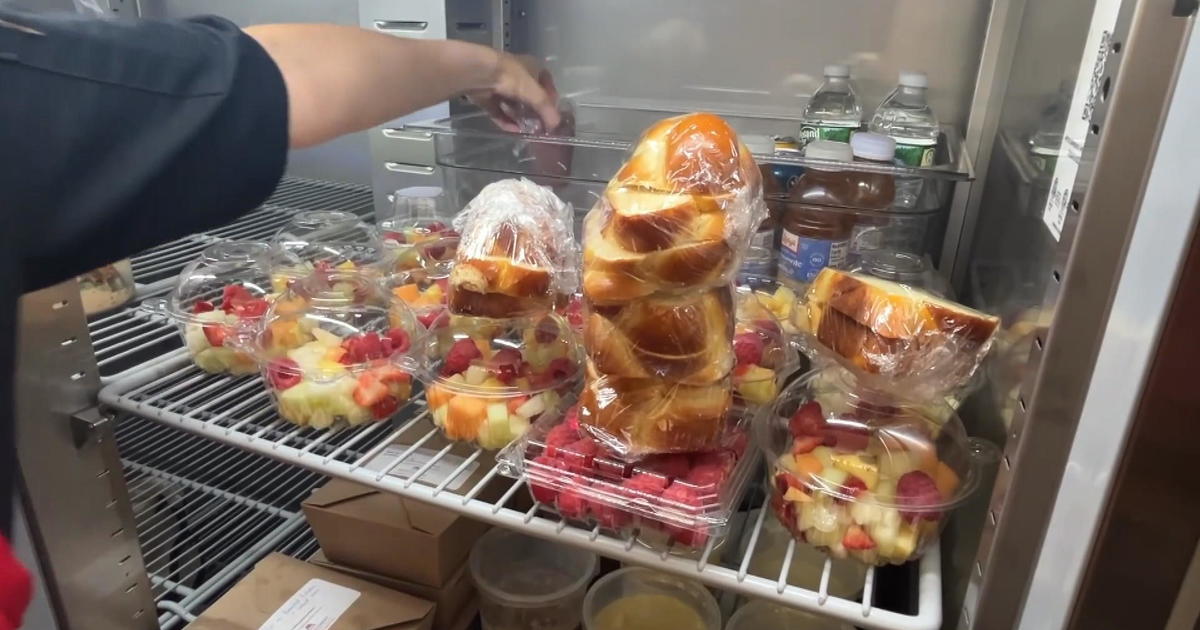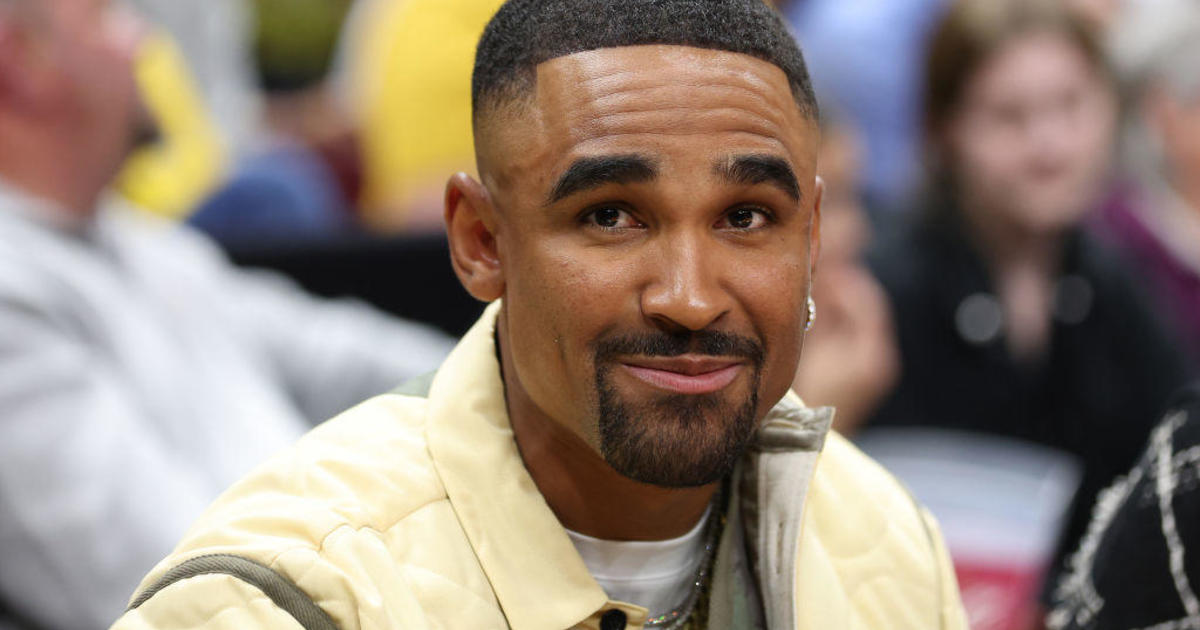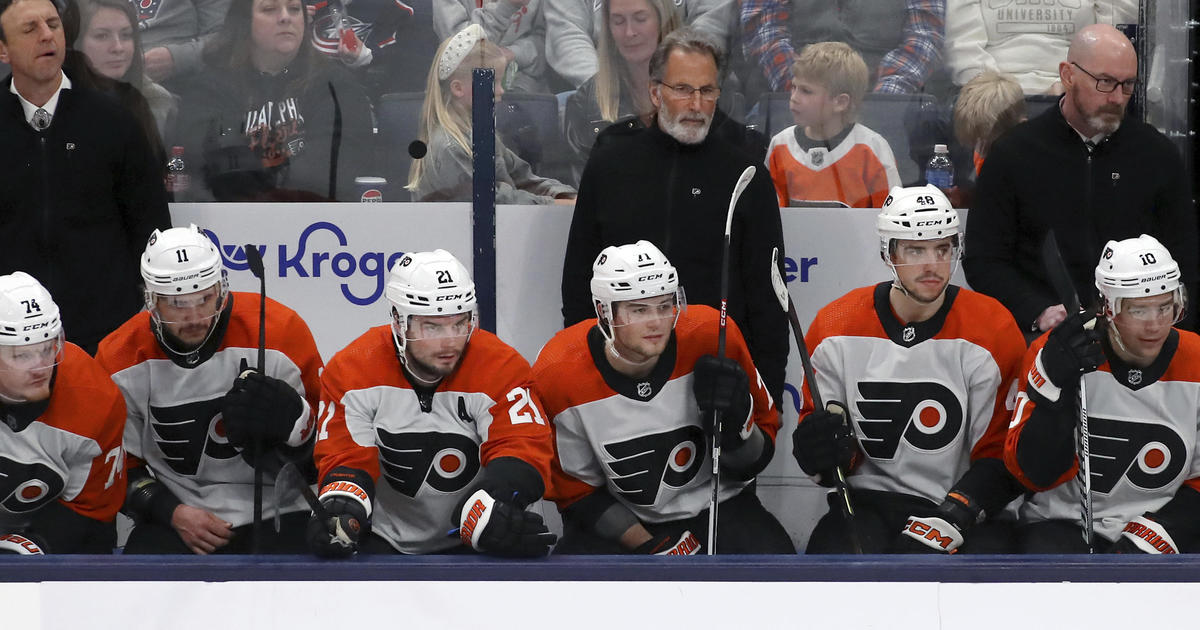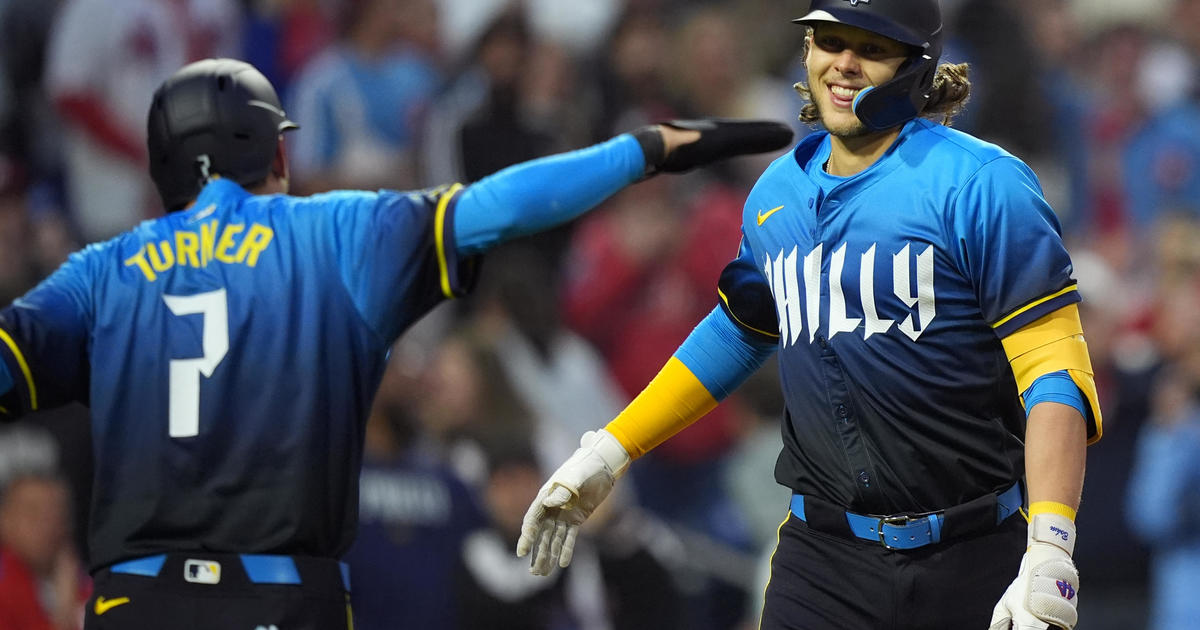Austin Wortley: A Portrait In Courage
PHILADELPHIA (CBS) -- Austin Wortley stood there with his hands on his hips looking through his helmet grill with young glassy blue eyes as the waning seconds ticked away. Not many knew he was gazing at a football field for a final time in pads and a helmet. The Harriton (Rosemont, Pa.) senior wanted to keep the news away from his teammates and teachers.
He wanted to inhale the tableau of a high school football game on a Friday night. This was his personal gift to himself: To play again one last time. No one else needed to know what he was going through, that this was it. He'd have to turn his helmet and pads in prematurely, no more wearing cleats on a football field.
That decision was already determined the night before Wortley was going to begin his senior year. Think about it: You beat cancer, gain the weight back that you lost, are fired up about playing and then this happens. You feel a protruding lump on the right side of your neck coming out of the shower. It's the cold slap in the face the 6-foot, 210-pound linebacker/offensive guard didn't need, it was back — that the battle he won with Hodgkin's lymphoma would be waged again.
Wortley beat it back in March. He played football with Hodgkin's lymphoma his junior year, wondering where this lethargy stemmed from each time he tried running up and down the field. The Hodgkin's lymphoma, a cancer originating from white blood cells that strikes young adults between the ages of 15-to-35, wasn't detected until sometime into his junior wrestling season. It's what made Wortley's recovery the first time such a dramatic turn of events.
Couldn't move
It's why he took that long, thousand-mile stare at the field, absorbing everything around him like a sponge soaking in memories. Harriton came up short that night, September 5, against Springfield High School, 35-19, but Wortley played exceptionally well. That he played knowingly with Hodgkin's lymphoma was itself both a major risk — and a courageous act.
His oncologist, Dr. Julie Stern from Children's Hospital of Philadelphia (CHOP), was against it and wouldn't go to sleep the night of the game until after she received a text message from Colleen Wortley, Austin's mother that Austin came through the game unscathed.
"I tried to play the hardest I ever played; they weren't going to let me play at one point, because of where the lump is on my neck," Austin said. "I told them I couldn't play defense, so I played right guard the whole game. I love playing linebacker, and I was really tired. I tried, but I felt the time was slipping away way too quickly. I was tired the previous scrimmages, but I was really tired the entire game. I knew I was playing with cancer and it was an odd feeling.
"But all seniors in high school have that moment when they play their last game. They don't know it, though. I knew this was my last game. I just felt like, you know how some people say it's an out-body-experience, that's what looking at the field one last time felt like for me. The entire field was sitting there and I soaked it all in with one glance and I didn't move. I couldn't. It was that one last time. Part of me was telling myself that I would be back here in some form or other. I thought of all the moments that I had and wanted to have; and the opportunities to hope and have to play. This was the last time I would have on the field with the cleats and I didn't want to leave."
First fight
Wortley's first fight with cancer originally started back on Thursday, December 30, 2010. It came by coincidence when Colleen called to get an update from orthopedic doctor Bradley Smith on the condition of Austin's older brother, Connor, who was recovering from torn ligaments in his thumb. She mentioned in passing if Smith could take a look at Austin, who they feared might be drained from calcium deposits in his neck.
Upon reviewing Austin, Smith knew something immediately wasn't right by the golf ball-sized lump that Austin had on the right side of his neck. Smith, Harriton's sideline doctor who works for Orthopedic Specialists in Bryn Mawr, has a little experience in this area. He was the doctor who first diagnosed former Boston College star Mark Herzlich's cancer.
"When Colleen mentioned that Austin was getting calcium deposits in his neck, I thought that it was highly unusual to have calcium deposits in that area; what they were was swollen nodules around the base of his neck and collar bone, and his neck was drastically swollen," Smith said. "I was concerned. I spoke to Austin about getting blood work done and an x-ray of his chest. Colleen definitely picked up that I was concerned, and she was definitely worried. The ultrasound showed swollen lymph nodes in his neck and his chest x-ray showed a mass in the middle of his chest. All in one day, Austin went from my office, to the lab, to get an x-ray, to his pediatrician, to an oncologist, and was at CHOP that evening."
Diagnosed with cancer. Teammates and classmates shaved their heads in support of Austin. The Harriton administration went above and beyond in many ways to make sure Austin kept pace with his academics — as Harriton's teachers have done this time, too, many coming to the Wortley home the days Austin can't make it to school.
This time, Wortley and his family have opted to attack the cancer much more aggressively. Wortley will undergo a stem cell transfusion a week after Christmas, a shunt outside of his skin, dialysis to filter his blood and then undergo radiation for the first time. There will be far more inpatient treatment and he's already lost his hair and 15-to-20 pounds.
But that hasn't deterred his spirits — nor Colleen's, who has been by her youngest child through it all, as she was the last time.
"We keep things as normal as we can," says Colleen, who despite her diminutive size is as strong as iron. "Many react when they hear Austin has it again, 'Oh my God, how did this happen?' We don't treat Austin like he's the boy in the bubble. Sure, it's emotionally stressful, but he goes out on Saturday nights. He goes to Eagles' games. People outside think life stops when a child get cancer, it doesn't. I feel fortunate Austin came and said something, because if he didn't, the cancer would have progressed. A lot of kids ignore the signs. I'm grateful he didn't.
"We're doing what we're told. The social workers tell you to live your life as close to normal as possible. It's why Austin still has a curfew on Friday nights. His overall prognosis for successful treatment is keeping a normal routine. The mental piece of this is as important as the physical piece. Austin talks to his doctors. He knows what's happening to him. Austin will be just fine. We are in fabulous hands. We couldn't get any better care than CHOP and we have full faith in our oncologist. It's the same protocol. You don't understand childhood cancer until you walk in their shoes. You have to be positive — there's no other way to put it."
Not about me
This time around, very few knew Austin relapsed. He did not want it to be broadcasted throughout the school, nor did he want his teammates to feel compelled to "Win One For Austin."
"The season and the games are about them, not me," he says. "Coach (Matt) Barr had told the rest of the coaching staff about the relapse and they all knew something wasn't right. I told Coach Barr that there was a lump in my neck and the doctor said she was worried. The entire time, he left it up to me. He said it was my choice to play. I'm happy he did. I wasn't going to take 'No' for an answer. I wanted to play, knowing it was my last game. I still wanted to play defense. I hadn't had that last moment. I didn't want to wonder what it was like imaging playing, I wanted to be on that field."
Austin carries a 2,140 SAT score, a 4.35 GPA out of 5.0 and is hoping to get into MIT, Tulane, Cornell or Cal to major in economics. He's hoping to hear from those schools in early-December. For now, he's focused on beating a formidable opponent he's already pancake blocked once.
"There is no need to have any fear, because I beat it before, and I knew if I had do it again I'd beat it again," Austin said. "What I get emotional about it is I know football is done. Kids that play take it for granted when they're out there. They think they're going to be out there forever. I think it's why I seem to revel in the small victories a lot more this time, though. Last time, it was to get through the process, and this time, it's step by step. I enjoy the times that I'm healthy and get to work out after school. It's the little things that mean more."
Reported by Joseph Santoliquito, CBS Sports



